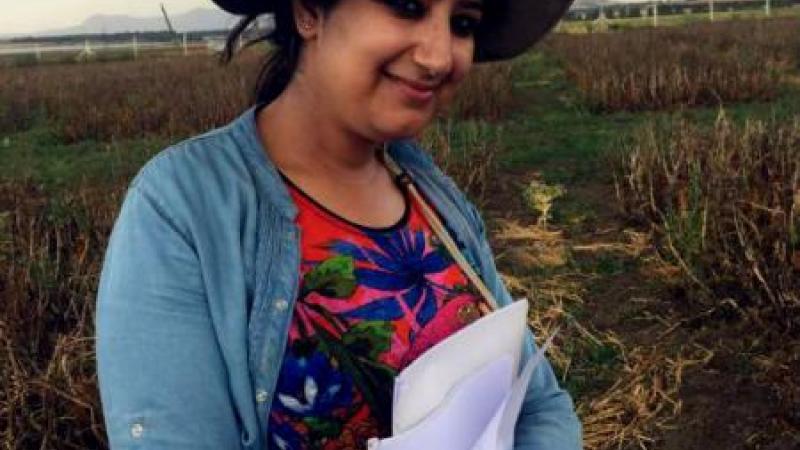Digging Dirt with a Budding Soil Scientist

Mouna Mechri lives in Tunisia and is completing her last year of PhD on agronomy. Recently, she was selected for training under the Young Agricultural Scientists Program (YASP), a component of the "Enhancing Food Security in Arab Countries" project.
Q. What topic did you choose to work on for your research?
I am studying the formation of organic matter of the soil in different cropping systems and in different regions of Tunisia. Through the YASP training, I learnt more about the biological nitrogen fixation from sowing legumes in cereal-based cropping systems and how that improves soil quality and yields.
Q. Kids often dream of being an astronaut, musician, teacher, etc. How did you come to be a soil scientist?
When I was in school, I actually wanted to be a journalist. But all my family and close friends encouraged me to become an agronomic engineer as my father is a farmer.I am happy now because I am working in a field that really makes me feel satisfied.With PhD, I can work in national and international organizations where I can learn more and improve my knowledge. I have many research questions in my mind and hope to answer them.
Q. The Young Agricultural Scientist Program is aiming to foster young scientists like yourself. What did you enjoy the most about it?
I had heard about the program from its national coordinator in Tunisia and I was very excited when my research proposal got accepted. I was able to learn new skills and got to know an international organization which can help me and my country to develop new research programs. Also I was excited to meet and learn from famous researchers that I never thought I could meet face to face.
Q. You could have chosen many topics in agriculture. Why soil?
Of course, I can choose many other topics, but I don't choose them because soil covers all!I wish to tell you a lovely story with my professor. He said, if the soil were to be a human being, it should be your close friend. Moreover, the study of organic matter of soil is poorly covered in Tunisia. Organic matter has important parameters that influence the characteristics of the soil and can determine the productivity - this is much needed in the semi-arid regions of Tunisia.
Q. 2015 is the International Year of Soils. Did you get to participate in any special activities?
Yes, I know about this and have an ambitious idea with my colleagues - we would like to create a soil and environment society which will work with scientists, farmers and new generation to create a new mentality of environmental preservation and sustainable development. I hope we are able to develop it.
Q. Women play a big role in farming in many countries and can contribute a lot if they are given the technical skills. What is the role of women in Tunisia?
In my country, women are involved in a wide range of activities - in irrigation, animal breeding, plowing, and planting. Since the woman deals with different resources, it is important for her to be sensitized and well-informed on sustainable ways to manage our natural resources. This can prevent deterioration and abuse of water, forests and soil. Also women are mothers and I think, they can help raise awareness of future generations about the natural resources, so they can have a life of dignity.
The Young Agricultural Scientist Program (YASP) is a national capacity strengthening initiative of the "Enhancing Food Security in Arab Countries" project. It selects motivated young men and women from participating countries to work alongside ICARDA's scientists in a range of areas, such as plant breeding, biotechnology, plant protection, agronomy, irrigation, water and soil management, conservation agriculture, cereal quality and seed technology, and agricultural economics.
Supported by: Arab Fund for Economic and Social Development and Kuwait Fund for Arab Economic Development
